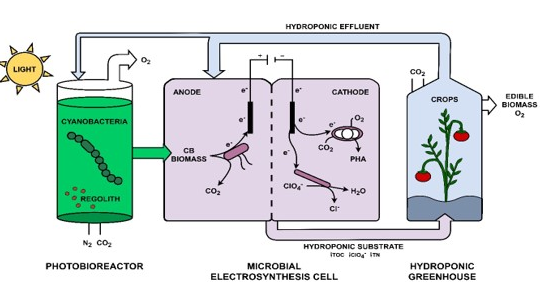Setting the ground for sustainable bioproduction in a Martian settlement

This project aims to develop a basis for bioproduction processes on Mars that rely on the planet’s natural resources, in order to increase the sustainability of future settlements. Furthermore, we expect to gain important insights and impulses for more resource-efficient technologies and concepts here on Earth.
This project is part of a 3 steps process, composed of (i) production of O2 and biomass by cyanobacteria (CB), using light and regolith as mineral substrate, (ii) transformation of the cyanobacteria effluent and regolith into a suitable hydroponic substrate and valuable secondary products (biofuel, bioplastic (PHA)) by electroactive bacteria in a Microbial Electrochemical System (MES), and (iii) growth of plants fed on the hydroponic substrate. The Research Group Environmental Process Engingeering (UVT) is leading the development of the second part of the process, by defining the characteristics and requirements of the input and output of this step, developing the specific electroactive community necessary to process the effluent (decrease of the fermentable components (Total Organic Carbon, TOC), removal of perchlorate (ClO4-) or excess of Nitrate/Ammonium (Total Nitrogen, TN), energy recovery into electricity) and convert it into desired products. A modelling of the entire in-situ resource utilization (ISRU)-based bioproduction concept (centered around the MES, and including cyanobacteria and plants) will be performed to guide its optimization and assess its efficiency.

![[Translate to English:] Zur Startseite des Fachgebiets Umweltverfahrenstechnik](/fileadmin/user_upload/fachbereiche/fb4/uvt/LOGO/UVT-Logo-Webseite.png)